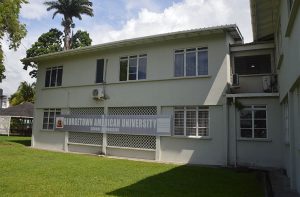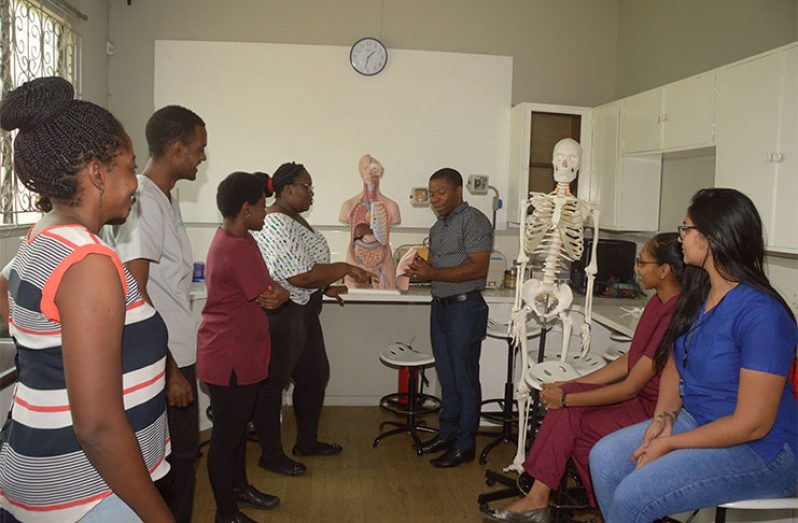–looking to expand to cover more than just medicine
PROFESSIONS in the medical field are always in demand because the health and well-being of people are of utmost importance in the development of a country and, generally, in the preservation of human existence.
While we are in the season of celebrating the successes of our children at the recently concluded Caribbean Secondary Education Certificate (CSEC) examination and the Caribbean Advanced Proficiency Examination (CAPE), we deem it fitting to highlight possible careers and institutions that Guyana’s youth can give consideration to and thus prepare themselves to give quality service to the country.

Georgetown American University (GAU) – School of Medicine – is an institution that has recently been making significant strides in the quality of education provided and the quality of students it produces.
So impressive is the institution that it has received several forms of accreditation of programmes offered, including one from the American Heart Association, to be the facilitator of the Heart Association’s courses in Guyana.
In an interview with this newspaper, Chief Executive Officer of the University, Dr. Melissa Varswyk, shared the evolution of her passion, and the many pathways being explored in expanding what is being offered at the institution.
Although Varswyk is a Medical Doctor, her passion is not to practise, but rather to train and help others to be qualified to practise.
As such, she said that the school was founded in November 2013, but opened its doors in June 2014, and started off with 12 students. Last November, the cohort graduated with excellent performances.
Though it may seem like quite a young and small school, it works in favour of the students, since they have all been performing well, notwithstanding the academic demands of the institution.
Giving a synopsis on how the programme is run there, Varswyk explained that there is a programme tailored for the students who would have just left school, and for those who’ve never had prior experience in the medical field.

This programme is called the Pre-medical Science programme and it runs for 16 months, equivalent to the first two years of college where basic college level science is addressed.
“After which you matriculate into the Doctor of Medicine (MD) programme.
This is a 4-year programme, and we follow the US system. The new US system follows a system-based approach to teaching medicine, so it is not subject-based anymore; we look at the systems. We start with the foundation in medicine, cardiovascular system, and all that goes wrong with the other systems,” Varswyk explained.
The MD programme however, consists of two years of clinical sciences, and the final two years entails students going into the hospital setting or medical center setting, where they shadow physicians.
“They are taught everything, from bedside manners and how to ‘work up’ patients to making a diagnosis and everything they should basically know. So, you will be taking your clinical knowledge, which is the basic sciences that you’ve learned and you will be putting it into the practical aspect of it using the basic science knowledge to make a diagnosis and to treat patients etc, under the supervision of a Physician,” she said.
She noted, however, that, for the final two years of the MD programme, students travel to different countries to complete the practical aspect.
GAU has affiliate institutions in different states in the US, and also in Guyana, for students to complete the final two years. Students have the option of choosing institutions within the two territories, to complete the programme. The difference is usually the cost factor.
Varswyk noted that they are currently working out agreements with institutions in places like Kentucky.
“Kentucky is much more affordable for Guyanese students. They would be able to go and do some of the clinical rotations that are not readily accessible in Guyana. These include Oncology, Radiology Neurology which are requirements for our clinical sciences. While some areas are optional, some are requirements so we will make sure that students have access to doing those rotations in Kentucky,” she pointed out.
As it relates to assessment, Varswyk said it is another important element, “to make sure that our students are on par with medical students in other parts of the world. One of the transparent examinations boards, the National Board of Medical Exams (NBME) addresses assessment of our students. The University purchases tickets for students to go online and submit those tickets and write the exams online and they receive their grades right away.”
This exam assesses how well they will do in the MD programme.

GAU is well equipped with functioning laboratory facilities and it also incorporates a lot of technology in its programmes. Varswyk said that in the new semester, they will be getting their first set of smartboards, which will allow them to use 3D applications and thus enhance interaction.
She also highlighted that the institution is currently working with its ISO consultant to ensure that it has ISO audit to receive ISO accreditation. This will allow the institution to easily secure its CAAM HP accreditation.
“CAAM HP is the governing body for the Caribbean region. It accredits all health sciences programs, nursing, dentistry and medicine and that’s out of Jamaica… and so every institution has until 2023 to be accredited. Before we go for that accreditation, we want to make sure our quality management system that we have is close to the best, and a functioning system that we can use. And that’s why we’re trying to do ISO before we go for CAAM HP,” she explained.
Expansion
Because the institution is a ‘University’, Varswyk said that they want to expand and include programmes outside of medicine.
“A university usually has multiple programs, so now we are looking at other programmes. We like to be innovative, so we like to look at areas that bring transformative changes and we’re looking for things like technology, we’re also looking into business and allied health sciences. Those are the areas we want to focus more on. So, in the near future, we will have a School of Medicine, School of Technology and School of Business, so we will be adding schools as we expand. That’s the good thing about having a university,” she said.
And they are also exploring the oil and gas industry, to also offer related programmes.
To balance it all off, the students engage in extra-curricular activities so as to keep them well rounded and so maintain high performance.
At a convenient location to many, the University is located on Croal Street, Georgetown. Varswyk said they are opened for applications, as the new academic semester commences on August 26, 2019. .












